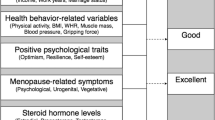Abstract
Objectives: Many studies have investigated anxiety and depression during the menopausal transition. However, there is little understanding of positive aspects of well-being among menopausal women. This paper reports on two studies which investigated how menopausal stage and age accounted for how women felt about their purpose in life, self-acceptance and social role. Method: In Study One, 304 women from a community sample completed structured questionnaires which included questions relating to demographic background and two subscales of the Psychological Well-being Inventory: purpose in life and self-acceptance. In Study Two, 203 participants from Study One returned a follow-up structured questionnaire related to purpose in life and social role. Results: Study One found that the effects of age group and menopausal group could not be separated: All women felt they would be more positive about these well-being measures in the future than they had been in the past and at present. Study Two found that women who were perimenopausal and postmenopausal did not feel as positive about their role/s in life as premenopausal women, regardless of their age. Conclusions: The results suggest that the menopause may indicate to women that their role/purpose in life is changing. It is important that any understanding of the menopause incorporate psychosocial aspects of women's lives. Further longitudinal studies are needed to explore well-being factors and the menopause.
Similar content being viewed by others
References
Mansfield PK, Voda AM. Woman-centred information on menopause for health care providers: Findings from the midlife women's health survey. Health Care Women Int 1997; 18: 55-72.
Dennerstein L. Depression in the menopause. Obstet Gynecol Clin North Am 1987; 4(1): 33-48.
Dennerstein L. Well-being, symptoms and the menopausal transition. Maturitas 1996; 23: 147-157.
Ballinger CB. Psychiatric aspects of the menopause. Br J Psychiat 1990; 156: 773-787.
Beyene Y. Cultural significance and physiological manifestations of menopause. A biocultural analysis. Cult Med Psychiat 1986; 10: 47-71.
McMaster J, Pitts M, Poyah G. The menopausal experiences of women in a developing country: ‘There is a time for everything: To be a teenager, a mother, and a granny’. women health 1997; 26(4): 1-13.
Avis NE, McKinlay SM. A longitudinal analysis of women's attitudes toward the menopause: Results from the Massachusetts Women's Health Study. Maturitas 1991; 13: 65-79.
Mansfield PK, Voda AM. From Edith Bunker to the 6:00 News: How and what midlife women learn about menopause. Women Ther 1993; 14(1–2): 89-104.
Matthews KA, Wing RR, Kuller LH, et al. Influences of natural menopause on psychological characteristics and symptoms of middle-aged healthy women. J Consult Clin Psychol 1990; 58(3): 345-351.
Diener E. Subjective well-being. Psychol Bull 1984; 95(3): 542-575.
Ryff CD. Happiness is everything, or is it? Explorations on the meaning of psychological well-being. J Pers Soc Psychol 1989; 57(6): 1069-1081.
Groenveld FPMJ, Bareman FP, Barentsen R, Dokter HJ, Drogendijk AC, Hoes AW. Relationships between attitudes towards menopause, well-being and medical attention among women aged 45–60 years. Maturitas 1993; 17: 77-88.
Longcope C. The endocrinology of the menopause. In: Lobo RA (ed.), Treatment of the Postmenopausal woman: Basic and Clinical Aspects, New York: Raven Press, 1994: 47-53.
Voda AM, George T. Menopause. Ann Rev Nurs Res 1986; 4: 55-75.
Greendale GA, Sowers MF. The menopause transition. Endocrinol Metabol Clin North Am 1997; 26(2): 261-277.
Deeks AA, McCabe MP. Relationship between menopausal stage and age and quality of relationships with partners, children and friends. Climacteric 1998; 1: 271-278.
Deeks AA, McCabe MP. Menopausal stage and age and perceptions of body image. Psychol Health 2001; 16: 367-379.
Deeks AA, McCabe MP. Sexual function and the menopausal woman: The importance of age and partner's sexual functioning. J Sex Res 2001; 38: 219-225.
Ryff CD. Psychological well-being in adult life. Curr Dir Psychol Sci 1995; 4(4): 99-104.
Ryff CD, Keyes CLM. The structure of psychological well-being revisited. J Pers Soc Psychol 1995; 69(4): 719-727.
Heidrich SM. The relationship between physical health and psychological well-being in elderly women: A developmental perspective. Res Nurs Health 1993; 16(2): 123-130.
Adelmann PK. Multiple roles and psychological well-being in a national sample of older adults. J Gerontol: Social Sci 1994; 49(6): S277-S285.
Hornstein GA. The structuring of identity among midlife women as a function of their degree of involvement in employment. J Pers 1986; 54(3): 551-575.
Baruch GK, Barnett R. Role quality, multiple role involvement, and psychological well-being in midlife women. J Pers Soc Psychol 1986; 51(3): 578-585.
Raup JL, Myers JE. The empty nest syndrome: Myth of reality? J Couns Dev 1989; 68: 180-183.
Author information
Authors and Affiliations
Rights and permissions
About this article
Cite this article
Deeks, A.A., McCabe, M.P. Well-being and menopause: An investigation of purpose in life, self-acceptance and social role in premenopausal, perimenopausal and postmenopausal women. Qual Life Res 13, 389–398 (2004). https://doi.org/10.1023/B:QURE.0000018506.33706.05
Issue Date:
DOI: https://doi.org/10.1023/B:QURE.0000018506.33706.05



